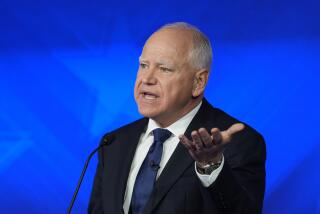POWs Were Left in Laos, Perot Tells Senate Panel : Vietnam War: He charges that U.S. officials ‘covered up’ this dark truth for more than 20 years.
- Share via
WASHINGTON — Ross Perot told a Senate committee Tuesday there is “overwhelming” evidence the United States left POWs behind in Laos after the Vietnam War and that officials in successive administrations “covered up, dissembled and finessed” this dark truth for more than 20 years.
The Texas billionaire, who has been closely involved with the POW/MIA issue since 1969, cited a number of newly declassified documents, intelligence reports and information based on personal contacts to support his conviction that the Nixon Administration was so eager to extricate itself from Vietnam in the spring of 1973 that it prematurely closed the books on evidence that POWs were still being held in Laos.
“There is no question we left men in Laos, and I think I can prove it to any rational person,” Perot said at the start of daylong testimony before the Senate Select Committee on POW/MIA Affairs, a special panel set up last year to investigate the fate of the 2,266 military personnel still listed as missing in Indochina.
But in a series of feisty, often impatient exchanges with senators--in which he also spoke of having his life endangered more than once by Vietnamese assassination squads--Perot offered little new evidence to support either the claims of a widespread cover-up or the hopes held out by relatives of the missing that some Vietnam-era servicemen may still be alive in Indochina today.
“Look at the map. Just look at the map!” Perot said, gesturing to a map of Southeast Asia that the committee had marked with miniature flags illustrating the locations for hundreds of sighting reports about American servicemen received over the years. “Discount 99% of them. Discount 99.9% of them. . . . Even (if) we agree there is one living American held against his will,” Perot said, “ . . . we have an absolute obligation to bring that person home.”
The senators agreed, but committee Chairman John Kerry (D-Mass.) later pointed out that Pentagon officials have already testified that most of the cases represented by the flags have been investigated and resolved. Sixty-nine percent of the sightings have been related to Americans who are now accounted for, 24% were determined to be fabrications and only 7% remain the focus of ongoing investigations, Kerry noted.
Pressed at one point to acknowledge the possibility that many of the reports of POWs still being held in Vietnam or Laos could be frauds, Perot said he agrees that “hoaxers” are a problem. But he declared them “bush league . . . compared to federal employees who have covered up, dissembled and finessed this issue for 20-some-odd years.”
Perot also complained that Bush Administration officials now seemed to be trying to “rewrite history” by suggesting that, when he was in the presidential race, his motives for becoming involved in the POW/MIA issue stemmed from his interest in commercial ventures with Vietnam.
He said he made the first of several trips to Vietnam and Laos in 1969 at the request of Nixon Administration officials, who wanted to do something about the POW issue but did not want it to look like a government effort. He said Vietnam is the “last place in the world” he would ever have considered doing business and he accused a “sick government” of “lying.”
Much of the questioning during Tuesday’s session, one in a series of hearings being held by the committee, focused on a briefing that Perot said he received from the CIA station chief at the U.S. Embassy in Laos in April of 1970. Perot said he was told by the station chief, whose name was not disclosed, that U.S. intelligence knew where American POWs were being held by the Pathet Lao, the Communist wing of the Lao Patriotic Front.
Murphy Martin and Thomas Meurer, two former Perot associates who also said they attended the briefing, later testified that the station chief told them that between 25 and 27 POWs were then being held by the Pathet Lao. However, McMurtrie Godley, the former U.S. ambassador to Laos, disputed the figures in his recollection of the conversation, and the CIA official told the committee in a still-unreleased deposition that he never briefed Perot or his aides at all.
“He claims that meeting didn’t take place. . . . But I’ll tell you right here, under oath, that it did take place,” Perot insisted.
More to Read
Get the L.A. Times Politics newsletter
Deeply reported insights into legislation, politics and policy from Sacramento, Washington and beyond. In your inbox twice per week.
You may occasionally receive promotional content from the Los Angeles Times.










